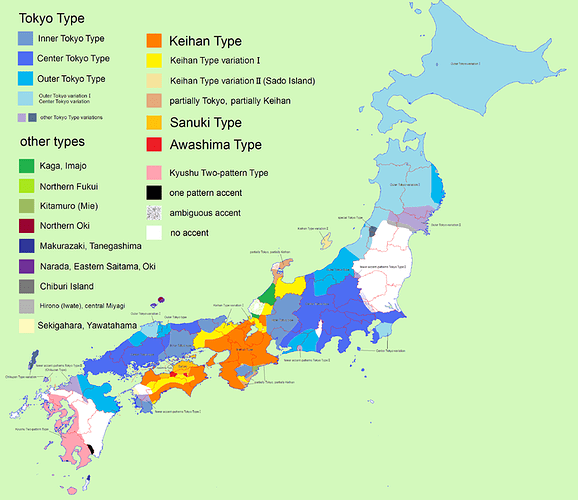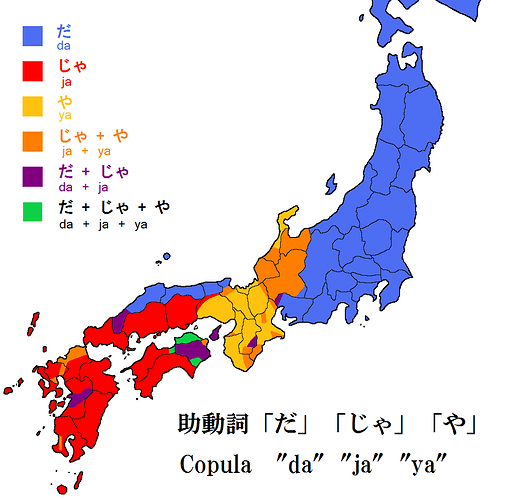Found this image on an old berkeley university page which shows the pitch for the first line of the momotaro http://hasegawa.berkeley.edu/Cambridge/2/MomotaroAccent.pdf .
If you move around the url a bit it also has a load of other stuff like recordings of momotaro in obscure dialects e.g. goshogawara http://hasegawa.berkeley.edu/Cambridge/2/MomotaroGoshogawara.mp3
Also a good one to put pay to the lie that ryukyuan is a dialect of japanese: http://hasegawa.berkeley.edu/Cambridge/2/MomotaroIshigaki.mp3
I am quite sure it is just member of Japonic language family:
I want to learn it at some point 
Have you got link to article you got your pdf from, or it was without one?
I just found it on it’s own and then traced back the url to here http://hasegawa.berkeley.edu/Cambridge/ . The reason I mentioned the claim that ryukyuan was a dialect was because for a long time it was referred to as one in order to justify replacing it with standard japanese, similar to how I think hokkien chinese was called one in order to try to replace it with mandarin.
It is for sure not common knowledge. No worries. There is a lot of people thinking Chinese is a language xD so small lack of precision is not that important. Most polish people think “kujawski” (I don’t know english word but it is not important) is dialect of polish… I know people defending idea that Afrikaans is just dialect of English (to this claim I am not sure what consensus is since I know next to nothing about Afrikaans but I am inclined to disbelieve it xD).
I just don’t want anybody to point out this and feel he prove the point that in Japanese pitch is actually essential for understanding xD
No accent doesn’t mean no pitch, it just means no accent. There is no accent in Japanese where everything is flat.
Edit: also looking that map it suggests Fukushima and Miyazaki have the same accents which is just nonsense.
there is no something like “no accent” in the language. If you speak without stress or pitch this is your accent technically speaking (but I am ready to accept links proving me wrong on that). “No” here means probably very very weak accent/pitch.
Yeh that’s the one. The implication is that swathes of Kyushu have the same accent as Fukushima. They don’t.
Think of the word ‘England’. In the English language, which is a stress accent language, the word is always pronounced with the stress on the first syllable; ENGland. It doesn’t matter what your accent is; London, north England, Scotland, Ireland, New York, California, the word is pronounced ENGland. Always.
Likewise here, the absence of a distinctive accent doesn’t mean there is no pitch in the language because Japanese is a pitch accent language and pitch is inherent.
To the credit to people making this kind of maps to help get the general feeling:
It is not possible to do it good.
1: there is no clear borders in language most of the time in real life.
- People of different dialect live in the same place. If you look at map to check where in Poland people speak “kujawski” you will be under false impresion it is quite a lot of people when in reality it is not true. I am not aware of even one small city in Poland having 30% of speakers of this language.
So this kind of maps are ruth working approximation to get the feeling.
Technically speaking we still are not able to define what is language and what is dialect. Ukrainian should be maybe consider a dialect of Russian (by mutual intelligibility principle), but try to say this to people speaking it 
I have no specific knowledge about those two you are bringing up so I will just assume you are right on that 
They are throwing in local dialect as well, which is slightly distracting, but you can hear the differences in accents quite well. My wife is from Kagoshima, so you hear from this why I have such an interest in accent
I will try but I will probably not hear it D :
I wonder sometimes what the reaction to foreigners who speak regional dialects is. I watch far too much content involving people from Osaka so I’m pretty sure if I had to have to a conversation it would probably influence the way I speak.
I’ve never met or know of anyone who has got to such a level that they sound like they’re from a specific region of Japan without throwing in obviously local phrases and words. I did get laughed at once in a bar in Hiroshima by a group of people because, that sound you make when you are surprised or impressed by something, that うーーー sound? apparently I sounded like a farmer when I made it so go figure.
Edit: everyone I know who has got to a very high level have all made a conscious effort to have a Tokyo accent
My fave example of seeing this is last time I went to a concert, and we were all stood on the left apart from this one lady, who suddenly looked around and practically yelled「あぁ!そうか!東京だ!」 and switched sides, and the entire escalator was in hysterics 
同じ弁ではない、高低アクセントは同じぐらいかもしれない。
Tap for English
I don’t think it means the same dialect, just that both have relatively flat pitch’s. (My wife is from 宮崎 and has worked in both 福島 and 東京都 — she said the 東京 folks struggled to understand her until she learned the 関東弁. Still only a sample size of one, but modest confirmation the map data could be usefully. Perhaps the differences lie more in the words between these two areas?)
holy crap! Some of those accents sound like Chinese to me! 
Yes, that a Pitch map. They probably did not care about dialect but characteristic of the pitch. I believe it is not easy job to classify pitch-accents. There are probably a lot of smooth transitions and border cases.


